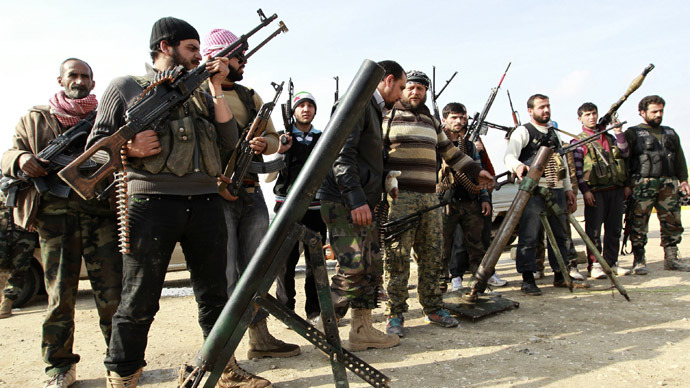...
 |
| The ISIS Clown Car is on the Move |
History is moving fast in the middle east these days, with the ISIS offensive eradicating the Syrian - Iraqi border, the Kurds' bloodless occupation of Kirkuk, the US thinking about getting involved militarily again and Iran continuing to consolidate her gains throughout the region. While there is no doubt that these forces were initially unleashed by the unnecessary and ill-conceived American invasion and occupation of Iraq in 2003, the more pressing question is what will happen next and what impact will it have on the region and the world?
Should the US get involved?
There is no doubt that ISIS are a very bad bunch. But this isn't a political conflict or any kind of traditional civil war. This is the worst possible kind of fight - a brutal sectarian, possibly genocidal kind of war where the parties involved see no possibility of living together in peace. So if the US were to get involved, ostensibly in support of the elected government against insurgents and terrorists, we would actually be choosing sides in a 1500 year old holy war. Even more ironically, we would be taking the Shiite side in that conflict, backing our 'enemies' Iran and Syria against our 'allies', notably Saudi Arabia and Pakistan.
As David Petraeus said in a speech in London yesterday:
"This cannot be the United States being the air force of Shia militias
or a Shia on Sunni Arab fight. It has to be a fight of all of Iraq against extremists who
do happen to be Sunni Arabs
And that, in a nutshell, is the problem. After decades of brutal oppression by Saddam Hussein's Sunni Baath party, Maliki and his al Dawa allies had no interest in living in peace. They returned the favor, brutally oppressing the Sunnis, ethnically cleansing them from their historic Baghdad neighborhoods, keeping them unemployed and without resources or effective representation.
So whatever the US chooses to do in Iraq, it will be seen by at least one side as supporting their genocidal enemies. If your goal is to enhance recruiting, see other more moderate Sunni groups join in the offensive and make the US a target for terrorist attacks, this would be the most efficient way to do it.
But isn't ISIS a threat to America?
Well, to the extent that any foreign terrorist organization can set off a truck bomb or arrange a mall attack, ISIS is no different. They ARE different, however, in that they are currently occupied with taking territory and consolidating those gains. Their fight is with al Assad and al Maliki and the Shiite militias that support them - they would not be inclined to spend resources trying to attack America while engaged in a two-front war.
Now, it is also true that one of the hallmarks of ISIS is its embrace of the most extreme and fanatical jihadis from every nation - not just from Muslim nations, but importantly from Europe and the US. This means that no matter how the whole battle to create the modern Caliphate turns out, there are going to be significant numbers of trained, battle hardened extremist jihadis with US and European passports. Those people could represent an ongoing problem for many years, but it seems likely that the intelligence agencies of those western nations will be keeping a very close eye on them.
What about Maliki?
Remember how I said that ISIS were very nasty people indeed? That also describes al Maliki to a tee. In addition to being a thug, he's a longstanding leader in the Da'wa party that formed the most powerful Shiite resistance to Saddam and the Baath, and his years in exile in Iran make him an Iranian tool. In their haste to validate the invasion and occupation, America was happy to allow early elections in 2006 - elections that were boycotted by the Anbar Sunnis, mostly because of the battle of Faluja. Elected or not, he has since acted in the role of sectarian partisan dictator, assigning to himself the portfolios of Minister of the Interior, Minister of Defense, Minister of National Security as well as maintaining the leadership of the Da'wa party. His obeisance to to Iran, his kleptocratic cronyism and his oppression of the Sunnis have all contributed to the point where even secular Sunnis are willing to align with ISIS to fight against his government.
The US is now making noises about demanding he step down, but there are some serious problems with that. First, the US has found itself in the awkward position of winking at extra-constitutional coups against duly elected leaders in Egypt, Thailand and Libya, in spite of her vaunted commitment to democracy. Another nation's removal of its democratically elected leader at the behest of the US should all but destroy any credibility American diplomats might have in encouraging democracy in other nations. And second, anyone who replaces Maliki will certainly come from Da'wa, so they are unlikely to represent a profound change in sectarian ideology, and very well might even be worse. There is some indication that even the Iranians are fed up with Maliki's corruption and incompetence, and they may very well convince him to resign and in that case, his successor would be hand-picked by Ayatollah Khamenei.
It's probably worth mentioning that there is much discussion in Washington of withholding American air power unless and until al Maliki becomes more inclusive of Sunnis and Kurds. Of course, that's patently absurd - there's no reason to believe he will do that, but even if he desperately wanted to, there's no way the Sunnis would believe he was telling the truth. It would take a year or two of model statesman-like leadership to begin to gain their trust, and it's not clear that there will be any need for American air power in Iraq in 2016.
Where do the Kurds fit in?
The Kurds are in an odd position. They've been constrained from taking Kirkuk, which they see as their natural capital, because to do so would have meant immediate civil war with Baghdad. But when the Iraqi army fled the ISIS offensive in Mosul, it made sense for the Kurdish militia, the Pesh Merga (the best fighters in the theater by far) to reinforce Kirkuk. So now the Kurds have essentially the Iraqi territory the wanted all along, and they have the troops, weapons and resources to hold it. But that's only a third of the Kurdish question. Kurdistan, if they had been lucky enough to get a country when Britain and France were handing them out after WW I, covers parts of Turkey and Iran too. Both of those nations have oppressed and fought with Kurdish separatists for decades. Especially in light of the Sunni's successes in carving out their own Caliphate in Syria and Iraq, it seems doubtful that the Kurds will want to settle just for that.
You can see the Iranians, looking for a bulwark against the rising tide of genocidal Sunni jihadis to their south, might make common cause with the Kurds. But it's extremely hard to see the Turks doing so, and it seems unlikely they fear an ISIS style insurgency in Turkey - if there is an 'oppressed' group in Turkey today (other than the Kurds, of course) it is the old-line Kemalist secularists.
How does it all play out?
Obviously, no one knows at this point. It does seem clear that there's no force available that can roll back the ISIS gains militarily - at least as long as they have the support of the Sunni population in general. Politically, it seems that ISIS is mostly at risk from the more moderate Sunnis, who if they feel mistreated by the religious extremists will just kill them and take over the insurgency for themselves. It happened before in Anbar - it was called "The Awakening". Now, instead of getting paid for hunting al Quaeda, they'll get their own chunk of Iraq and Syria free from the Shiite oppression emanating from Baghdad and Tehran.
Over the longer term, Islamic genocidal sectarian conflicts are not good for the world. There's the problem of energy prices - if this conflict expands and has an effect on oil shipments from the Persian Gulf then you can expect a global recession. If you start to see real Shiite gains against the Sunni Arabs as a result of opportunities provided by open sectarian warfare, the possibility of a broader regional sectarian war becomes greater, and Saudi Arabia is the most heavily armed Arab nation and Pakistan has nuclear weapons. One of the things you CAN expect at some point is the destruction of one of the Shiite most holy shrines. Remember it was the 2006 bombing of the Golden Dome in Samara that set off the last Iraqi sectarian civil war.
At this point, any Western, US or NATO involvement in the conflict would seem terribly counterproductive. You never want to take sides in a civil war, and it's really not clear that we have any interest in supporting EITHER side of this conflict. At some point, things are going to stabilize and some very angry people are going to be looking to settle some scores. The fewer of them who feel they have a score to settle with us the better for American interests in general.
...





